'I don't sing trendy music'
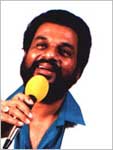 His voice is unparalleled in the annals of South Indian music.
His voice is unparalleled in the annals of South Indian music.
Dr Kattiserry Joseph Yesudas learnt the fundamentals of Carnatic music at five. And gave his first stage performance at the age of 12.
Despite qualifying for the Sangeethabhushanam and Ganabhushanam, he was rejected by All India Radio and as singer in the film
Nalla Thanka. He finally got a break in the Malayalam film, Kaalpadukal (Footprints). Malayalam film songs were never to be the same again.
The singer, who idolises Mohammed Rafi, Chembai Vaydhyanatha Bhagavathor and Dr Balamuralikrishna, has recorded over 30,000 songs, and has sung in every Indian language except Kashmiri and Assamese. He has on his mantelpiece seven national awards, eighteen Kerala State Awards, eight Tamil Nadu State Awards, five Karnataka State Awards, four Andhra Pradesh State Awards, and a Bengal State Award.
More shelf-space is taken up by the Padma Shri, Sangeetha Raja, Sangeetha Chakravarthy, Sangeetha Sagaram, the Sangeet Natak Akademi-conferred title of Aasthana Gayakan, the Government of Madhya Pradesh's Lata Mangeshkar Award, the Star of Cochin Award in 1992, a Sur Singar Samsad Award, a Filmfare Award for Chitchor, the Music for Peace Award by UNESCO and a Geetanjali citation, presented by the President of India, for promoting National Integration.
Oh yes, he also has a doctorate -- conferred on him by Annamalai University in 1989.
Despite the sustained success, Yesudas profile is really that of an ascetic, a monk who worships music. Or, equally, a pilgrim on a never-ending search for the essence of the art.
Yesudas began his Hindi career in 1974 under Salil Choudhury, singing all the five songs (of which
Ni sa ga ma pa ni, sa re ga, Aa aa re mitwa was popular) for
Anand Mahal.
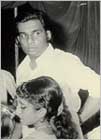 His first Hindi release,
His first Hindi release,
Chhoti Si Baat, saw him hit the charts with his duet with Asha Bhosle, Jaaneman jaaneman tere do nayan.
His other Hindi hits include
Madhuban khushboo deta hai (Saajan Bina Suhagan), Dil ke tukde tukde (Dada), Sawan ko aane do (Saawan Ko Aane Do), Jab deep jale aana and Gori tera gaon badaa pyaara (Chitchor), Aaye na baalam (Swami), Maana ho tum (Toote Khilone), among many others.
This year, he released his first English-cum-world music album,
Ahimsa (Music Today) and Sitaron Mein Tu Hi (Universal).
Dr Rajiv Vijayakar met the legendary singer during the latter's stopover in Mumbai, en route to Madras. Excerpts from the interview:
How did Ahimsa happen?
Well, there was this concert in Los Angeles, organised by my friend. At the end of which Ricardo Barrantes -- who conceived and composed Ahimsa -- asked me if I would sing for him. I told him we could discuss it later -- I was not interested in any pop album, you know! *laughs*
I never thought he would call me back -- but he did, a couple of months later. I realised he had been listening to many of my recordings and that he was planning something different and on a big scale.
I realised he was a very talented person. The very first song he sang to me was Circle of return -- a very difficult composition with half beats, twists and turns. The entire album took us three-and-a-half years to complete.
The title song was performed way back in 1999, wasn't it?
Yes, I performed this song on November 14 at the Millennium Concert organised by the World Peace Organisation in Paris. It was recorded then. It was the perfect time and place to present the song.
The organisers of that show had a great concept -- they brought artistes from hostile countries to work together. Junoon, the Pakistani band, played with me.
The song Saari saari does not sound like you...
That is because they processed my voice electronically after it was recorded. I also tried to change my voice, which makes this song difficult to sing on stage. I also composed two of the raga-based numbers.
How was the experience of doing a world music album?
Actually, I was given a lot of freedom, which is what I enjoyed most. Ricardo would record the basic track first, and then embellish it. The tabla, flute and children's voices were all added in Madras.
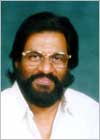
Is the concept of Ahimsa something you believe in?
The basic core of Ahimsa, the album as well as the principle, is forgiveness and sacrifice. These transcend languages and cultures.
I was asked how comfortable I was singing in English. I pointed out that English is today an international language that brings together people from different cultures.
Nowadays, there is too much himsa (violence). Sad, considering that in our culture, even a rude word is considered an act of violence.
At the essence of every religion is Supreme Power. It is a matter of faith and belief. Through my experiences, I have surrendered completely to that Supreme Power.
For 40 years now, I have been singing, travelling, performing. I am not doing it on my own. There is some Power which is driving me. In fact, I cannot begin my concerts without offering my prayers to the Almighty.
Often, I am asked how I feel while singing bhajans, since I am a Christian. I respond, that I impart total devotion to whatever I sing.
All religions preach love, sacrifice and peace. But today, sadly, religion creates hatred because it is used as a weapon.
You were excommunicated by the Church in Kerala for singing bhajans and performing in temples...
Not really. They thought I was converting to another religion. They realised I was not, and that God does not have any religion.
Your name means servant of God, doesn't it?
That's right. When I entered the film industry, I was asked to change my name -- it was fashionable to have Hindu names like Dilip Kumar or Madhubala.
But my father told me that there was no point in changing one's name merely to get something in return. He told me, "If you do not get anything, leave the industry."
You see, my father respected all religions. When I was five or six, I was told in the Catechism class that we Christians go to Heaven after death. That had me worried. I asked my father, "If I die and go to Heaven, who will I play with? My non-Christian friends will be somewhere else!"
My father said, "Think about the answer to this question yourself. When you grow up, you'll know the answer."
I was very keen that my children should not be baptised. It was not that I was against baptism, it is just that I thought the right approach was to let them grow, become good human beings first, and then let them choose whether they wanted to be baptised.
What about the reverse? Did the Hindus object to your performances in temples?
Well, the Ayyappa cult in Kerala is a very unique one. They have a dargah and a church in their complex -- their philosophy is very deep. I have sung there often.
I was not allowed into the Guruvayoor temple, however. Some private temples in Kerala were also very strict about that. But in Tamil Nadu, things are different, more liberal.
What of your other album, Sitaron Mein Tu Hi, how did that happen?
Shivaji Gupta of Universal Music wanted me to do this. I told him what I told Ricardo earlier -- I would not want to sing certain kinds of songs. I then met the composer, Lalit, and liked his compositions.
Later, I was told that he had composed most of these songs in the 1970s! In fact, it was his desire to have me sing them -- he insisted that if I did not, they would never be recorded.
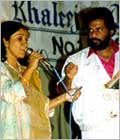
Which is your personal favourite in Sitaron Mein Tu Hi?
I really like Dosti humne toh ki hai rain se and Tumse bichhadkar.
Do you believe that this album was not marketed properly?
That's true of most of my albums. I do not sing trendy music.
What is the solution?
The media. It is up to them to support good music.
When I sing, I want people to concentrate on the music, the lyrics and the singing. I do not want someone dancing around on stage.
See, we cannot fight trends. But it would help if genuine music lovers started a television channel devoted to promoting standard music.
Who decides what is standard music?
Well, obviously songs that have lyrical value and strong melody. They should also mirror our culture. Do you hear the sitar, sarangi or tabla today?
This will also help the younger generation. If you serve them only pizza and no idlis, how will they know that there is a choice?
Recently, I sang only devotional songs at a concert in Bombay, and the younger generation enjoyed it.
Your peak, in Hindi music, was in the seventies and early eighties, yet you sang very little for the top names of the time: Laxmikant Pyarelal, Kalyanji Anandji, R D Burman and Rajesh Roshan. How come?
Well, as it happened, I was busy in the South and was also setting up my studio in Trivandrum. So there was a practical problem.
How do you approach the songs you are asked to sing?
A song is a composer's baby. So if it comes to me, I think about the lyrics and the mood. I give my own variations only when asked to.
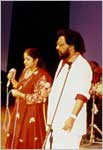
The lyrics are, of course, the soul of the song. But nowadays, there is this unfortunate trend of suppressing the singer's voice, which is what delivers the poetry and enhances the orchestration and effects.
In our studios, for instance, we are very particular about this. We have to keep our singers' vocals up.
Nowadays it's the opposite. Maybe they are covering up the deficiencies of the lyrics, tune and vocals. *laughs*
Among singers, Mohammed Rafi is my all-time idol and I keep his general excellence in mind always. But once I am in front of the microphone, I forget all my idols and sing in my own way.
You have been criticised for mixing Carnatic and Hindustani styles in your singing...
I want to take Indian culture and music to the rest of the world. I freely mix Hindustani and Carnatic styles -- each has its own pluses and minuses.
I do not want to be bound only to Carnatic music. That is why I learnt Hindustani as well.
Is there any scope for Indian music abroad?
Melody appeals to everyone. And our music is strong in melody.
Our problem is the language. Perhaps that is why instrumentalists like Pandit Ravi Shankar and Zubin Mehta have made more of an impact abroad, than our singers have.
CHECK THIS OUT!
Hear the best of Yesudas on Rediff Radio!